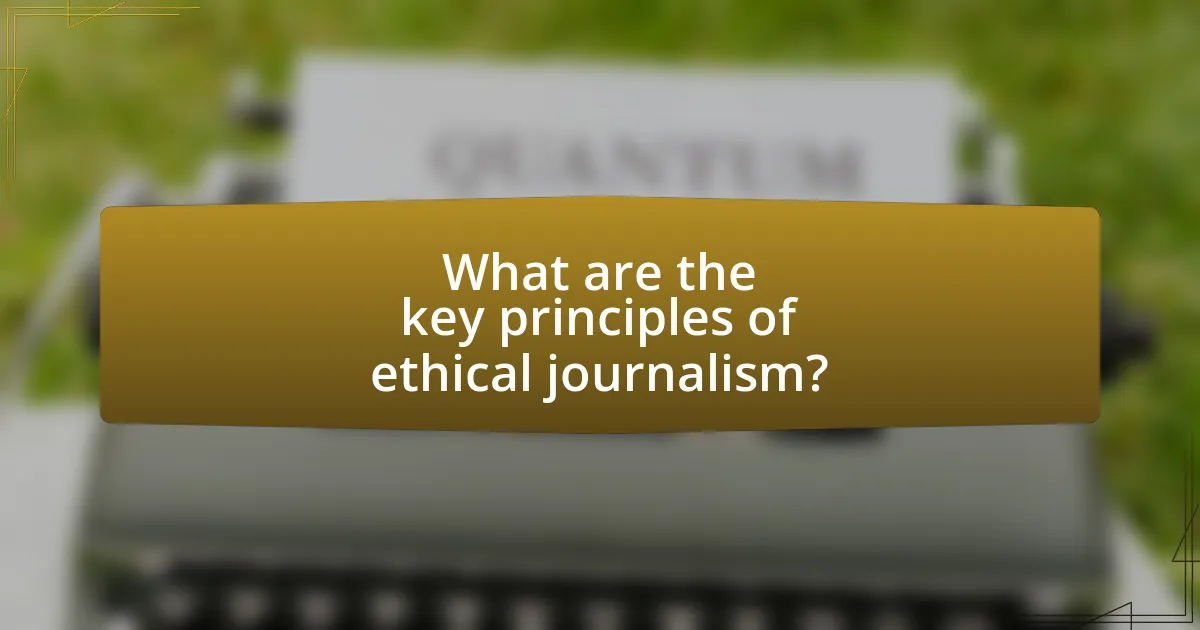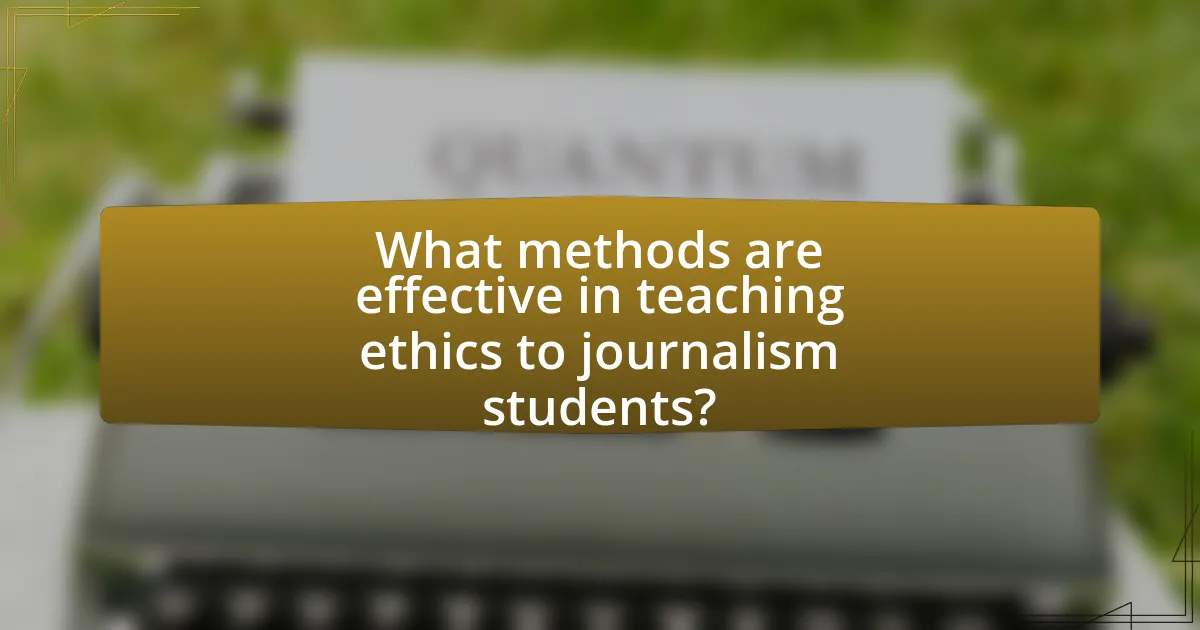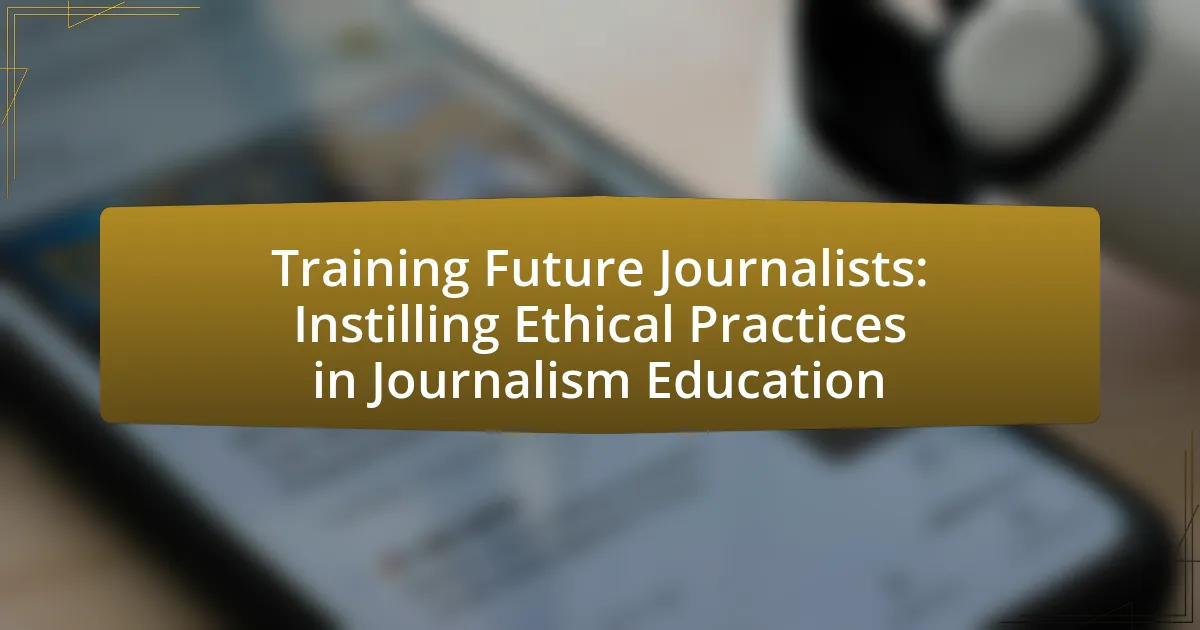The article focuses on the critical importance of instilling ethical practices in journalism education to prepare future journalists for the complexities of the profession. It outlines key principles of ethical journalism, including accuracy, fairness, independence, accountability, and transparency, and discusses how these principles shape journalism curricula. The article emphasizes the role of integrity and accountability in maintaining public trust, the effectiveness of teaching methods such as case studies and role-playing, and the significance of mentorship in guiding ethical decision-making. Additionally, it addresses the challenges of teaching ethics in a rapidly evolving media landscape and offers practical strategies for enhancing ethical journalism education.

What are the key principles of ethical journalism?
The key principles of ethical journalism include accuracy, fairness, independence, accountability, and transparency. Accuracy requires journalists to verify information before publication, ensuring that facts are correct and sources are reliable. Fairness involves presenting all sides of a story without bias, allowing for a balanced perspective. Independence mandates that journalists remain free from influences that could compromise their integrity, such as political or commercial pressures. Accountability means that journalists must take responsibility for their work and be willing to correct errors. Transparency involves being open about sources and methods, fostering trust with the audience. These principles are essential for maintaining credibility and public trust in journalism.
How do these principles shape journalism education?
Ethical principles shape journalism education by establishing a framework for responsible reporting and integrity in the profession. These principles guide curricula to emphasize the importance of accuracy, fairness, and accountability, ensuring that future journalists understand their role in society. For instance, the Society of Professional Journalists’ Code of Ethics outlines key tenets such as seeking truth and minimizing harm, which are integrated into educational programs to prepare students for real-world challenges. By instilling these ethical practices, journalism education fosters a commitment to public trust and the pursuit of truth, essential for maintaining democracy and informed citizenry.
What role do integrity and accountability play in ethical journalism?
Integrity and accountability are fundamental to ethical journalism as they ensure the credibility and trustworthiness of news reporting. Integrity involves adhering to moral and ethical principles, which guides journalists to report truthfully and fairly, thereby fostering public trust. Accountability requires journalists to take responsibility for their work, including correcting errors and being transparent about their sources and methods. For instance, the Society of Professional Journalists emphasizes that ethical journalism is rooted in honesty and accountability, which are essential for maintaining the public’s confidence in the media. This relationship between integrity, accountability, and ethical journalism is crucial for training future journalists to uphold these standards in their practice.
How can transparency be taught to future journalists?
Transparency can be taught to future journalists through structured education that emphasizes ethical reporting practices and accountability. Journalism programs can incorporate case studies that highlight the importance of transparency in building trust with audiences, such as the Watergate scandal, which demonstrated the consequences of lack of transparency in reporting. Additionally, practical workshops can be implemented where students engage in real-world reporting scenarios, requiring them to disclose their sources and methodologies, thereby reinforcing the value of openness. Research indicates that programs focusing on ethical journalism, like those developed by the Poynter Institute, have successfully improved students’ understanding of transparency and its role in responsible journalism.
Why is it important to instill ethical practices in journalism education?
Instilling ethical practices in journalism education is crucial because it shapes the integrity and credibility of future journalists. Ethical training ensures that journalists understand the importance of accuracy, fairness, and accountability in their reporting, which are foundational principles of responsible journalism. Research indicates that ethical lapses can lead to misinformation and public distrust; for instance, a study by the Pew Research Center found that 62% of Americans believe that news organizations are often influenced by political bias. By embedding ethical standards in journalism education, institutions prepare students to navigate complex moral dilemmas and uphold the public’s trust in the media.
What are the consequences of unethical journalism?
Unethical journalism leads to a loss of public trust in media, which can result in decreased audience engagement and credibility. When journalists prioritize sensationalism or misinformation over factual reporting, they contribute to the spread of false narratives, which can misinform the public and influence societal perceptions. For instance, a study by the Pew Research Center found that 63% of Americans believe that fabricated news stories cause confusion about basic facts, highlighting the detrimental impact of unethical practices on public understanding. Additionally, unethical journalism can lead to legal repercussions for media organizations, including lawsuits and financial penalties, further undermining their operational viability.
How does ethical journalism impact public trust?
Ethical journalism significantly enhances public trust by ensuring accuracy, fairness, and accountability in reporting. When journalists adhere to ethical standards, they provide reliable information that the public can depend on, which fosters a sense of credibility. Research indicates that 70% of people are more likely to trust news organizations that prioritize ethical practices, such as fact-checking and transparency. This trust is crucial, as it encourages civic engagement and informed decision-making among the public, ultimately strengthening democracy.

What methods are effective in teaching ethics to journalism students?
Effective methods for teaching ethics to journalism students include case studies, role-playing, and discussions of real-world scenarios. Case studies allow students to analyze ethical dilemmas faced by journalists, fostering critical thinking and decision-making skills. Role-playing exercises enable students to experience ethical decision-making firsthand, enhancing their understanding of the consequences of their choices. Additionally, discussions of current events and ethical issues in journalism encourage students to engage with contemporary challenges, promoting a deeper comprehension of ethical standards. Research indicates that experiential learning methods, such as these, significantly improve students’ ability to navigate ethical complexities in their future careers.
How can case studies enhance ethical understanding in journalism?
Case studies enhance ethical understanding in journalism by providing real-world scenarios that illustrate the complexities of ethical decision-making. These detailed analyses allow journalism students to engage with actual dilemmas faced by professionals, fostering critical thinking and ethical reasoning. For instance, examining the case of the Watergate scandal reveals the importance of investigative integrity and accountability, highlighting how ethical lapses can have significant societal repercussions. By analyzing such cases, students can better grasp the consequences of their choices, thereby reinforcing the necessity of ethical standards in their future careers.
What are some notable examples of ethical dilemmas in journalism?
Notable examples of ethical dilemmas in journalism include the coverage of sensitive topics such as suicide, where journalists must balance the public’s right to know with the potential for harm to vulnerable individuals. Another example is the decision to publish leaked information, as seen in the case of Edward Snowden, where journalists faced the challenge of weighing national security against the public’s interest in government transparency. Additionally, the dilemma of reporting on conflicts of interest arises when journalists must navigate their relationships with sources, as demonstrated in the coverage of political campaigns where personal biases can influence reporting. These examples highlight the complex ethical landscape journalists must navigate to maintain integrity and public trust.
How can role-playing scenarios be utilized in ethics training?
Role-playing scenarios can be utilized in ethics training by simulating real-life ethical dilemmas that journalists may face, allowing participants to practice decision-making in a controlled environment. This method enhances critical thinking and moral reasoning, as individuals engage in discussions and reflections on their choices during the scenarios. Research indicates that experiential learning, such as role-playing, significantly improves retention of ethical principles and prepares future journalists to navigate complex situations effectively. For instance, a study published in the Journal of Media Ethics found that students who participated in role-playing exercises demonstrated a deeper understanding of ethical standards compared to those who received traditional lectures.
What role do mentorship and guidance play in ethical journalism education?
Mentorship and guidance are crucial in ethical journalism education as they provide aspiring journalists with the necessary support and real-world insights to navigate complex ethical dilemmas. Experienced mentors help students understand the importance of integrity, accuracy, and accountability in reporting, which are foundational principles of ethical journalism. Research indicates that mentorship significantly enhances the ethical decision-making skills of journalism students, as they learn to apply theoretical knowledge to practical situations through guided experiences. For instance, a study published in the “Journalism & Mass Communication Educator” highlights that mentorship fosters critical thinking and ethical reasoning, enabling students to confront ethical challenges effectively.
How can experienced journalists influence the ethical practices of students?
Experienced journalists can influence the ethical practices of students by serving as mentors and role models, demonstrating the importance of integrity and accountability in reporting. Their real-world experiences provide students with practical examples of ethical dilemmas and the decision-making processes involved in journalism. For instance, seasoned journalists often share case studies from their careers that highlight the consequences of ethical breaches, reinforcing the significance of adhering to ethical standards. Additionally, experienced journalists can lead workshops and discussions that focus on ethical frameworks, such as the Society of Professional Journalists’ Code of Ethics, thereby equipping students with the tools to navigate complex ethical situations in their future careers.
What are the best practices for mentoring future journalists?
The best practices for mentoring future journalists include fostering critical thinking, encouraging ethical decision-making, and providing hands-on experience. Mentors should engage mentees in discussions about real-world scenarios to develop their analytical skills and ethical frameworks. Additionally, facilitating internships or practical assignments allows aspiring journalists to apply their knowledge in professional settings, enhancing their learning. Research indicates that mentorship programs significantly improve the confidence and competence of journalism students, as evidenced by a study published in the Journalism & Mass Communication Educator journal, which found that 85% of mentees reported increased job readiness after mentorship experiences.

How can journalism programs assess the effectiveness of their ethics training?
Journalism programs can assess the effectiveness of their ethics training through a combination of surveys, case studies, and performance evaluations. Surveys can gauge students’ understanding and application of ethical principles before and after training, providing measurable data on knowledge retention. Case studies allow students to analyze real-world ethical dilemmas, demonstrating their ability to apply learned concepts in practical situations. Performance evaluations, including peer reviews and instructor assessments, can further highlight students’ ethical decision-making in journalistic practices. Research indicates that programs employing these methods see improved ethical reasoning among graduates, as evidenced by studies from the Poynter Institute, which found that structured ethics training significantly enhances journalists’ ethical awareness and decision-making skills.
What metrics can be used to evaluate ethical understanding among students?
Metrics that can be used to evaluate ethical understanding among students include assessments of ethical reasoning, case study analyses, and reflective essays. Ethical reasoning assessments measure students’ ability to analyze and apply ethical principles to real-world scenarios, while case study analyses require students to evaluate ethical dilemmas in journalism, demonstrating their understanding of ethical standards. Reflective essays allow students to articulate their personal ethical frameworks and how they apply to their journalistic practices. Research indicates that these methods effectively gauge students’ comprehension of ethical issues, as they encourage critical thinking and self-reflection, essential components of ethical journalism education.
How can feedback from industry professionals inform ethics education?
Feedback from industry professionals can significantly inform ethics education by providing real-world insights and practical examples of ethical dilemmas faced in journalism. This feedback allows educators to align curriculum with current industry standards and expectations, ensuring that students are prepared for the ethical challenges they will encounter in their careers. For instance, a study by the Pew Research Center found that 66% of journalists believe that ethics training is essential for new entrants into the field, highlighting the importance of integrating professional perspectives into educational frameworks. By incorporating this feedback, ethics education can become more relevant and applicable, fostering a deeper understanding of ethical practices among future journalists.
What role do student reflections play in assessing ethics training?
Student reflections play a critical role in assessing ethics training by providing insights into students’ understanding and internalization of ethical principles. These reflections allow educators to evaluate how well students grasp ethical concepts and apply them to real-world scenarios, which is essential in journalism education. Research indicates that reflective practices enhance critical thinking and ethical reasoning, enabling students to articulate their values and decision-making processes. For instance, a study published in the Journal of Media Ethics highlights that reflective assignments lead to deeper engagement with ethical dilemmas, fostering a more nuanced understanding of journalistic integrity.
What are the challenges in teaching ethics in journalism education?
Teaching ethics in journalism education faces several challenges, including the rapid evolution of media technology, diverse ethical standards across cultures, and the difficulty in instilling a strong ethical framework in students. The fast-paced changes in digital media create dilemmas regarding misinformation and the pressure to produce content quickly, often compromising ethical standards. Additionally, journalism students come from various cultural backgrounds, leading to differing perceptions of ethical practices, which complicates the establishment of a unified ethical curriculum. Research indicates that many journalism programs struggle to effectively integrate ethics into their curricula, often relegating it to a secondary status rather than making it a core component of training. This inconsistency can result in graduates who are ill-prepared to navigate ethical dilemmas in their professional careers.
How can educators address varying ethical perspectives among students?
Educators can address varying ethical perspectives among students by fostering an inclusive environment that encourages open dialogue and critical thinking. This approach allows students to express their viewpoints while engaging with diverse ethical frameworks. Research indicates that discussions on ethics in journalism, such as those highlighted in the “Journalism Ethics: A Casebook Approach” by David L. Altheide and Christopher J. Schneider, demonstrate that case studies can effectively illustrate the complexities of ethical decision-making. By incorporating real-world scenarios, educators can help students analyze and navigate differing ethical perspectives, ultimately preparing them for the multifaceted challenges they will face in their journalism careers.
What strategies can be implemented to overcome resistance to ethical training?
To overcome resistance to ethical training in journalism education, institutions can implement strategies such as integrating ethical discussions into existing curricula, utilizing real-world case studies, and fostering an open dialogue about ethical dilemmas. Integrating ethical discussions ensures that students see the relevance of ethics in their daily practice, while real-world case studies provide concrete examples of ethical challenges journalists face, making the training more relatable. Additionally, fostering an open dialogue encourages students to express their concerns and perspectives, which can lead to a more engaged and receptive learning environment. Research indicates that active participation in discussions enhances retention and understanding of ethical principles, thereby reducing resistance to training initiatives.
What practical tips can enhance ethical journalism education?
Practical tips to enhance ethical journalism education include integrating real-world case studies into the curriculum, fostering critical thinking through discussions on ethical dilemmas, and emphasizing the importance of transparency and accountability in reporting. Case studies, such as the coverage of the Watergate scandal, illustrate the consequences of ethical breaches and the value of integrity in journalism. Encouraging students to engage in role-playing scenarios can also help them navigate complex ethical situations, reinforcing the application of ethical principles in their future careers. Additionally, collaborating with professional journalists to provide mentorship and feedback can bridge the gap between theory and practice, ensuring that students understand the ethical standards expected in the field.
How can educators create an engaging curriculum focused on ethics?
Educators can create an engaging curriculum focused on ethics by incorporating real-world case studies and interactive discussions that challenge students to analyze ethical dilemmas. This approach fosters critical thinking and allows students to apply ethical theories to practical situations, enhancing their understanding of ethical practices in journalism. Research indicates that experiential learning, such as role-playing and simulations, significantly improves student engagement and retention of ethical concepts, as evidenced by a study published in the Journal of Media Ethics, which found that students exposed to active learning strategies demonstrated a 30% increase in ethical decision-making skills compared to traditional lecture-based methods.
What resources are available for teaching ethics in journalism?
Resources available for teaching ethics in journalism include textbooks, online courses, professional guidelines, and case studies. Textbooks such as “The Ethical Journalist” by David Ward provide foundational knowledge on ethical principles. Online platforms like Coursera and edX offer courses specifically focused on journalism ethics, allowing educators to integrate modern teaching methods. Professional organizations, such as the Society of Professional Journalists, provide ethical guidelines and resources that can be utilized in the classroom. Additionally, case studies from real-world journalism scenarios serve as practical examples for students to analyze ethical dilemmas, reinforcing the importance of ethical decision-making in journalism.

Leave a Reply